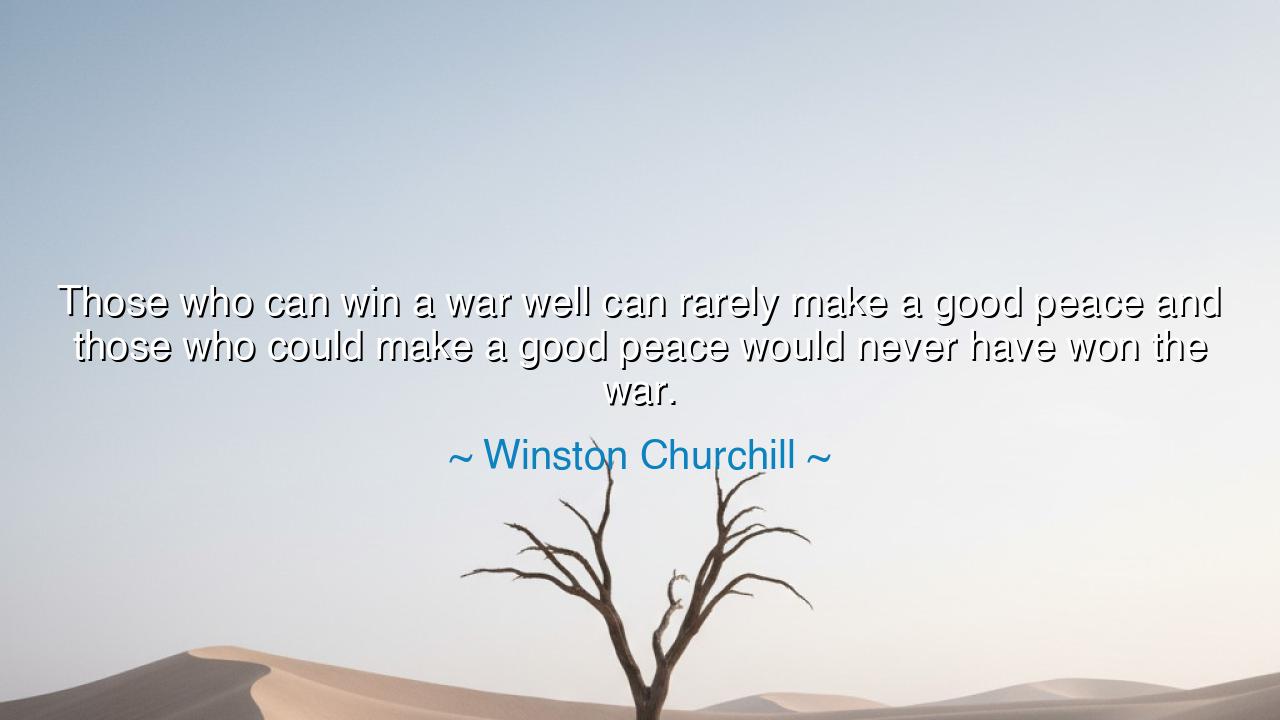
Those who can win a war well can rarely make a good peace and
Those who can win a war well can rarely make a good peace and those who could make a good peace would never have won the war.






Hear the grave and fiery wisdom of Winston Churchill, war-leader and orator, who declared: “Those who can win a war well can rarely make a good peace, and those who could make a good peace would never have won the war.” These words rise like a paradox, yet within them is the deep truth of human nature and the cycles of history. The qualities that win battles—the iron will, the ruthless resolve, the readiness to sacrifice all—are rarely the same qualities that build reconciliation, heal wounds, and nurture the fragile seed of peace. Likewise, the gentle souls capable of weaving peace rarely carry the hardened edge needed to endure the chaos of war.
To win a war demands a heart steeled against hesitation. The commander must be willing to destroy, to press forward even when blood flows in rivers. Strategy requires cunning, boldness, and often deception. It rewards the qualities of aggression, resilience, and unflinching resolve. Yet these very qualities, so powerful in war, may become dangerous in peace. For the builder of peace must listen, yield, forgive, and soften. A mind sharpened like a sword for war does not easily bend into the shape of a plowshare. Thus Churchill reminds us that victory on the battlefield does not guarantee wisdom at the council table.
History itself proves his words. At the end of the First World War, generals and statesmen who had prosecuted the war with iron determination presided over the Treaty of Versailles. They demanded vengeance, reparations, and humiliation for Germany. In doing so, they sowed the seeds of bitterness that would sprout into the flames of the Second World War. The men who had won the war could not create a just and healing peace. Their strength in victory blinded them to the mercy needed for stability. Thus Churchill’s paradox lived before the eyes of the world.
Yet the other side of his saying is equally true: those who could make a good peace might never have endured the war. The qualities of empathy, patience, and conciliation, though noble, are rarely enough to resist an invader or to rally a nation under fire. Imagine if Europe in 1940 had been led only by gentle souls who sought harmony above all—would they have resisted Hitler’s armies, or would they have been crushed beneath tyranny? The hard truth is that peace-makers alone cannot hold back destruction when the wolves of war howl. The defenders must first stand, and they are seldom the same as the healers who follow.
Consider the figure of Abraham Lincoln. He was both war-leader and peace-maker, yet even in his greatness the tension of Churchill’s words can be seen. Lincoln carried the terrible burden of the Civil War, resolute in preserving the Union. But when victory came near, his heart turned to mercy: “With malice toward none, with charity for all.” He longed to make a good peace, to bind the wounds of the nation. Yet he did not live to see it carried out, and those who followed lacked his balance. Reconstruction became scarred by vengeance and division. Even the rare man who could fight and forgive could not carry both tasks to their end.
The meaning for our lives is both tragic and instructive. It teaches us that no single person, and no single set of qualities, is enough for every stage of conflict and reconciliation. The sword is not the plow. The voice that rallies men to battle is not the same voice that soothes their wounds when the battle is over. Therefore, wisdom lies in knowing when to yield one task to another, when to let the warrior step aside so the peacemaker may rise.
The lesson, then, is plain: do not seek to be both conqueror and reconciler at once. If you must fight, fight with courage. If you must make peace, do so with gentleness. And if you are a leader, know when to pass the torch. For the world needs both—the strong hand that can win the war, and the open hand that can make the peace. Practical action follows: in your own conflicts, whether in family, work, or community, recognize when the time for firmness has ended and the time for healing has begun. Do not let the habits of war linger into the season of peace.
So let Churchill’s paradox stand as a guiding fire: “Those who can win a war well can rarely make a good peace, and those who could make a good peace would never have won the war.” Remember always that humanity’s survival depends not only on warriors, nor only on peacemakers, but on the wisdom to know when each must take the stage. For the cycle of life demands both: the shield and the olive branch, the sword and the song, the fire that defends and the peace that endures.






AAdministratorAdministrator
Welcome, honored guests. Please leave a comment, we will respond soon